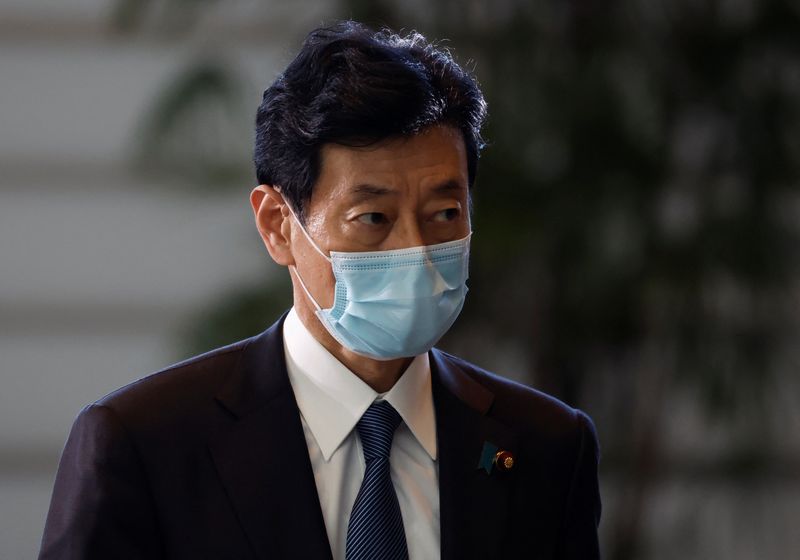By David Brunnstrom and Michael Martina
WASHINGTON (Reuters) -Japan's trade and industry minister said on Thursday post-Cold War free trade and economic inter-dependence had bolstered authoritarian regimes and the United States and like-minded democracies should counter them with a "new world order."
"Authoritarian countries have amassed tremendous power, both economically and militarily," Japan's Minister of Economy, Trade and Industry Yasutoshi Nishimura said in a speech at the Center for Strategic and International Studies in Washington.
"We must rebuild a world order based on the fundamental values of freedom, democracy, human rights and the rule of law," he added.
Nishimura spoke ahead of a visit to Washington next week by Japanese Prime Minister Fumio Kishida for talks expected to cover issues including Ukraine, North Korea and China's tensions with Taiwan. That summit will be preceded by talks between defense and foreign ministers of the two countries.
Kishida said this week he would discuss Tokyo's new security policy after Washington's key ally in countering China's growing might in Asia last month unveiled its biggest military build-up since World War Two.
Nishimura's call to arms comes amid growing concern after Russia's invasion of Ukraine that Beijing and Moscow will use their control over energy resources and sway over manufacturing supply chains to stop the United States, Japan, Europe and others from opposing their diplomatic and military goals.
Leaders from the Group of Seven industrialized nations are likely to discuss how to respond to economic coercion when they meet in May in the Japanese city of Hiroshima, Nishimura said.
"We might need to make preparations to identify the choke points of countries wanting to engage in coercion and then take countermeasures if necessary," he said.
Nishimura warned that democracies need to protect their industrial power and guard against the loss of technologies, particularly those that could be diverted to military use.
He urged that U.S.-Japan cooperation extend beyond semiconductors to biotechnology, artificial intelligence and quantum science.
He also promised to work more closely with Washington on export controls, although he did not say whether Tokyo would match the sweeping restriction on exports of chip manufacturing equipment imposed by U.S. President Joe Biden's administration in October.
"It is ... absolutely imperative for us to reinforce our cooperation in the area of export controls," he said. "We will implement strict export controls grounded in international cooperation while engaging closely in the exchange of views with the United States and other relevant countries."
Nishimura met with U.S. Commerce Secretary Gina Raimondo ahead of his speech. A Commerce Department statement said they discussed the importance of working together on research and development and export controls.
The statement said they were joined by executives from International Business Machines (NYSE:IBM) Corp and Japan's Rapidus Corp who shared an overview of their collaboration on semiconductor R&D.
The Biden administration said in October it planned to ink a deal with allies in the near-term to bring them on board with sweeping new U.S. rules curbing China's access to sophisticated chipmaking tools in a bid to slow its technological and military advances.
Nishimura is to meet with U.S. Trade Representative Katherine Tai on Friday to sign a memorandum for the launch of a task force to promote human rights and international labor standards in supply chains, the U.S. Trade Department said.
Japan's Yomiuri Shimbun newspaper cited Japanese officials as saying the move was spurred by issues such as alleged forced labor of minority Muslims in China's Xinjiang region and the new body will aim to promulgate within Japan regulations that Washington has strengthened to tackle such problems.
